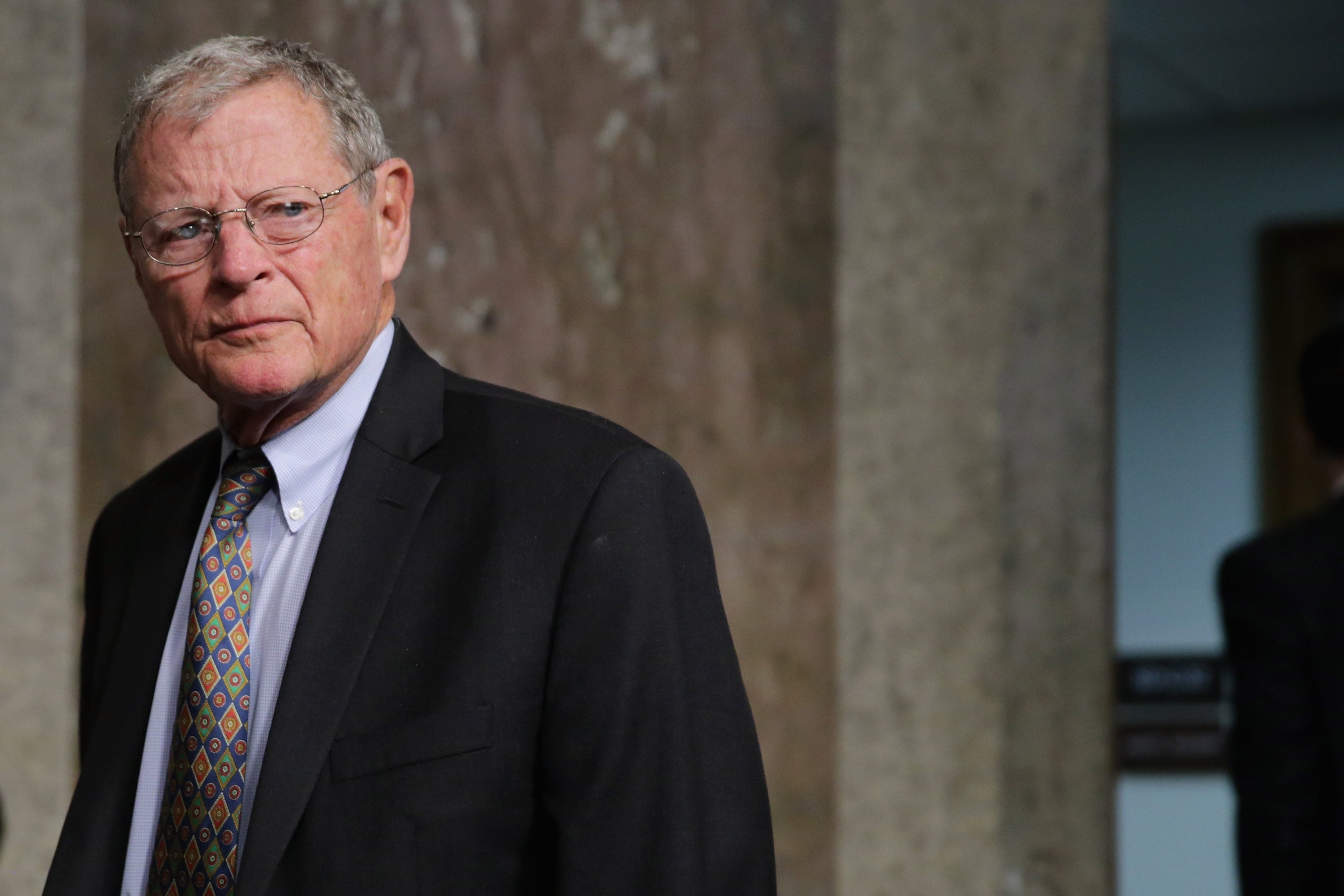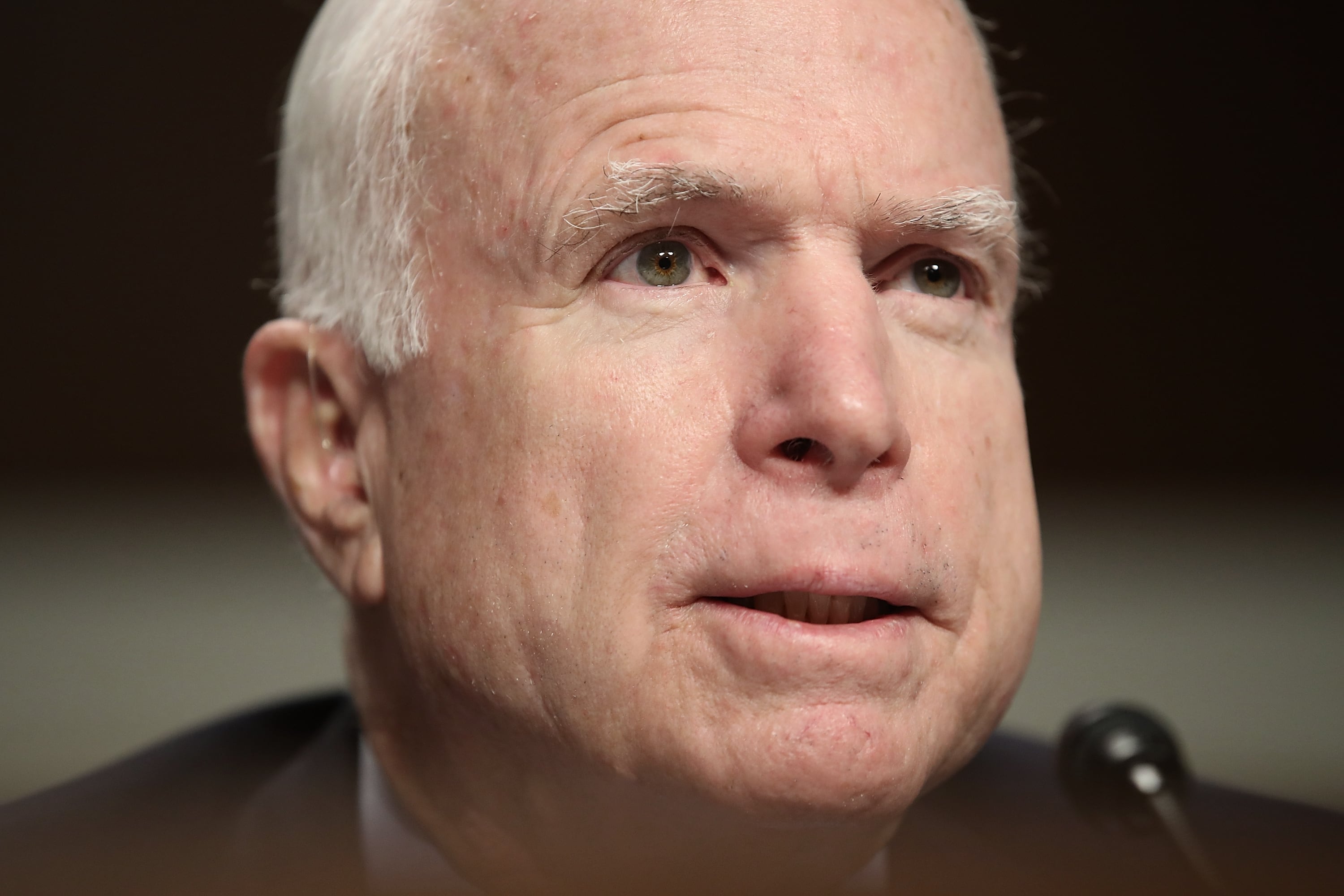WASHINGTON — Sen. Jim Inhofe has been the face of the Senate Armed Services Committee for the last nine months. Now he will officially lead it.
Senate Majority Leader Mitch McConnell announced the 83-year-old Inhofe, R-Okla., as the new chairman of the committee on Wednesday, formally recognizing him as the chamber’s top voice on military and defense policy issues.
Inhofe has led the panel as acting chairman since its previous chairman, Sen. John McCain, who died last month, went home last year to receive treatment for brain cancer.
During that time, Inhofe wielded significant influence over the annual defense authorization bill process, although he frequently noted that McCain was still acting as the senior committee leader from afar.
A land developer before he was elected to the House in 1986, Inhofe served eight years on the House Armed Services Committee and the last 23 on the Senate counterpart, including as its ranking member from 2013 to 2015.
RELATED

In a statement, Inhofe called the chairmanship an honor.
“America is facing new and unprecedented threats that are different from anything we’ve seen before," he said. “As chairman, it will be my priority to address these threats while maintaining a staunch commitment to service members and their families, as well as continue the bipartisan tradition of rigorous accountability and oversight of the Defense Department.”
Inhofe has not been averse to saber rattling — calling for the deployment of fighter jets and warships to Europe in response to reports of Russia invading Ukraine — or blasting a flailing program, of which he has seen many.
At one hearing in 2017, while grilling Navy officials over the littoral combat ship’s delays and cost overruns, Inhofe lamented failures that includes the B-1 and B-2 bombers, the Army’s aborted Future Combat Systems, and today’s F-35 Lightning II and guided-missile destroyer Zumwalt.
“We’re always talking about cost overruns, we’re talking about increased costs and delays,” Inhofe said. “It’s not just the Navy. It’s a problem, it’s all over.”
McConnell praised Inhofe, an Army veteran, as the right choice to take over the key committee.
“Jim Inhofe filled in for Sen. McCain during a difficult year,” he said Wednesday. "He rose to the occasion and helped lead the committee in passing crucial legislation that honored the example of his predecessor and the volunteers who defend our nation.
“He possesses rich experience on the committee, including decades of work on behalf of American service members as well as his own military service.”
A reliable conservative
Still, U.S. weapon makers have reason to feel good about Inhofe’s ascendancy to SASC chairman. Inhofe has repeatedly voiced opposition to statutory budget caps, hailed the $716 billion allotted to national defense for 2019, and argued for action to shore up the U.S. military’s edge against Russia and China.
“We’re glad we got to the point where we can give the top priority to defending our nation, as it should have always been,” Inhofe said of the 2019 defense policy bill in a June floor speech. “All the time that we have been held back over the last 10 years, our peer competition, Russia and China, they haven’t held back.”
Known as an arch-conservative, Inhofe has a 96 percent lifetime ranking from the American Conservative Union and has been a partisan warrior on national security issues.
Like McCain, Inhofe fought against Obama’s defense budgets as hindering military readiness and modernization. As far back as 2009, Inhofe spoke against the military ignoring Russia and the North Korean nuclear threat to refocus on lower-tier foes.
During Jim Mattis’ confirmation hearing for defense secretary, Inhofe argued the Air Force was at its “smallest and oldest,” that only a third of Army brigades were ready to fight, that the Navy fleet was too small and that Marine aviator flight times were at historic lows.
Inhofe has a long history of social conservatism, including his support of President Donald Trump’s ban on transgender people from serving in the military.
After the Pentagon allowed gay people to openly serve in the military, Inhofe in 2013 criticized the Obama administration for providing special leave for gay military personnel, analogizing it as using the military "as their activism arm for their liberal social agenda.”
Inhofe’s relationship with Trump has been less contentious than McCain’s.
Before Trump won the presidency, Inhofe was invited to Trump Tower as part of a national security advisory council. Since then, Inhofe has praised Trump’s Afghanistan strategy, his summit with North Korean leader Kim Jong Un, his withdrawal from the Iran nuclear deal and the opening of the U.S. Embassy in Jerusalem.
While acting chairman, Inhofe has largely been deferential to Trump administration witnesses. He recently told one panel of Trump’s nominees to the Pentagon: “It’s a great team. I’m just very proud. I’ve never seen a panel of more qualified people.”
RELATED

New policy priorities
Inhofe’s Senate floor eulogy last week paid tribute to McCain, but also noted their differences. He sided against McCain’s unsuccessful efforts to privatize military commissaries and trigger a new Base Closure and Realignment Commission process.
In opposing the BRAC round, Inhofe cited the upfront costs and questioned the wisdom of shuttering facilities “we may be needing as we are rebuilding” the military.
That position puts him on a collision course with Democrats, who have advocated it as a cost-saving measure, including SASC ranking member Jack Reed, D-R.I., and House Armed Services Committee ranking member Rep. Adam Smith, D-Wash.
Democrats have made no secret they hope to ride anti-Trump sentiment to take control of the House. If they succeed, Inhofe would face a situation McCain never had to in negotiations over the annual defense authorization bill.
Africa will likely be a topic under discussion in the SASC, as Inhofe has taken more than 140 trips to Africa over about 20 years, and he had a hand in creating U.S. Africa Command. This year alone, he has vocally opposed shrinking U.S. military operations there after a disastrous Niger raid and called on Army leaders to assign new adviser brigades to Africa.
“If you pull back from operations in Africa, you’re going to have a massive terrorist transition going down through Djibouti,” Inhofe said. “They’re going to go where there’s least resistance, and there’s a history of that.”
Inhofe is a proud defender of defense activities in his own state, particularly Fort Sill, home the Army’s artillery school.
Before the $11 billion Oklahoma-produced Crusader was canceled in 2002, Inhofe fought in vain to preserve it. It was to be the Army’s next-generation self-propelled howitzer, initially designed to destroy Soviet tanks in Europe.
Leo Shane III contributed to this report.
Joe Gould was the senior Pentagon reporter for Defense News, covering the intersection of national security policy, politics and the defense industry. He had previously served as Congress reporter.
